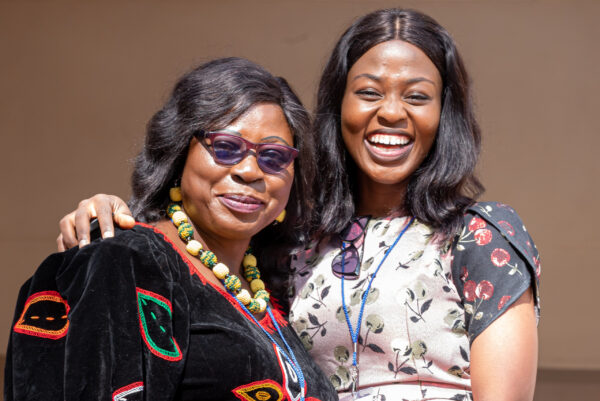By: Beverly Ndifoin
Entering the Forests & Livelihoods, Assessment, Research, and Engagement (FLARE) Annual Meeting in Nairobi, Kenya, felt like stepping into a vibrant community where knowledge, passion, and a shared commitment to conserving humanity intersect. As a graduate student in Global Affairs specializing in Sustainable Development, this conference was not just an academic congregation but a stepping stone to understanding the relevant connection between research and action for the flourishing of forests, trees, and the people they sustain.
In an immersive atmosphere teeming with researchers, practitioners, policymakers, and subject experts, I found myself navigating through numerous ideas that have since resonated deeply with me. To think my mother also attended this conference was a perfect scenario of stars aligning. Let’s take a quick drive-through on my first day at the conference. My mother and I had just arrived at the CIFOR gate and were about to check-in. As I struggled to attach a rope to my name tag, a lady with a welcoming smile and bubbly energy offered to help. This was the beginning of my friendship with Lulu, one of the conference participants. She was easy to talk to, and we instinctively connected as we shared passions and expectations of the conference. We also became each other’s photographers as we immortalized vital moments of our time at the meeting.
As the conference progressed, the narrative that captivated me the most was the interlink between food trees on farms and nutrition. It struck a personal chord, reflecting on my childhood days spent alongside my mother, nursing and planting fruit trees on our farms where the fruits of our labor, like avocado, plum, and mangoes, became one of the sources of sustenance for our family. An enlightening research presentation on the relationship between food trees on farms and nutrition by Emilie Vansant ignited these farm-fresh memories.
For me, this conference was not just a professional milestone. It also bore a personal significance for me. Accompanied by my mother, a dedicated agro-forester and policy advocate in Cameroon, the conference became a space to share professional and deeply personal moments of learning and growth as I connected with the person who inspired my environmental consciousness.
The ambiance of the World Agroforestry Center – the event’s host, could not go unnoticed. The lush campus, adorned with trees and harmonious wildlife, waved at us as though to offer a breath of fresh air. An inspiring highlight was the event’s eco-consciousness, embracing a plastic-free environment and reusability in dining, reflecting a sense of sustainability commitment.
Beyond the conference walls, Nairobi unfolded its tales. When I visited the Giraffe Center, the experience of feeding giraffes added a touch of wonder and joy, just seeing how forest preservation leads to biodiversity preservation. Visits to the Village Market and the Kariokor Market also unveiled the vibrant tapestry of Nairobi’s culture.
The FLARE Annual Meeting was not merely a professional stepping stone; it was a transformative journey that expanded my vision and instilled in me a profound understanding of the intricate relationship between research, action, and the sustenance of forests, trees, and the communities they serve. These reflections and experiences have shaped my academic pursuits and ignited a renewed commitment to ethical, community-centric, and stakeholder-inclusive research for the well-being of our shared environment.
The insights from this conference continue to resonate in my academic pursuits, personal journey, and future contributions to sustainable development and forest conservation.
Here are my key takeaways from the conference:
1. Purposeful Research: Emphasizing the need for research that transcends the pages of academic journals and drives positive change in the lives of communities.
2. Community Engagement: Advocating for the invaluable role of communities in conservation efforts, highlighting the power of collaboration and education.
3. Bridging Research and Policy: The crucial role of research in informing policies and the importance of translating findings into actionable initiatives.
As an environmental journalist, the opportunity for me to share insights on transforming complex data into engaging narratives was refreshing.

